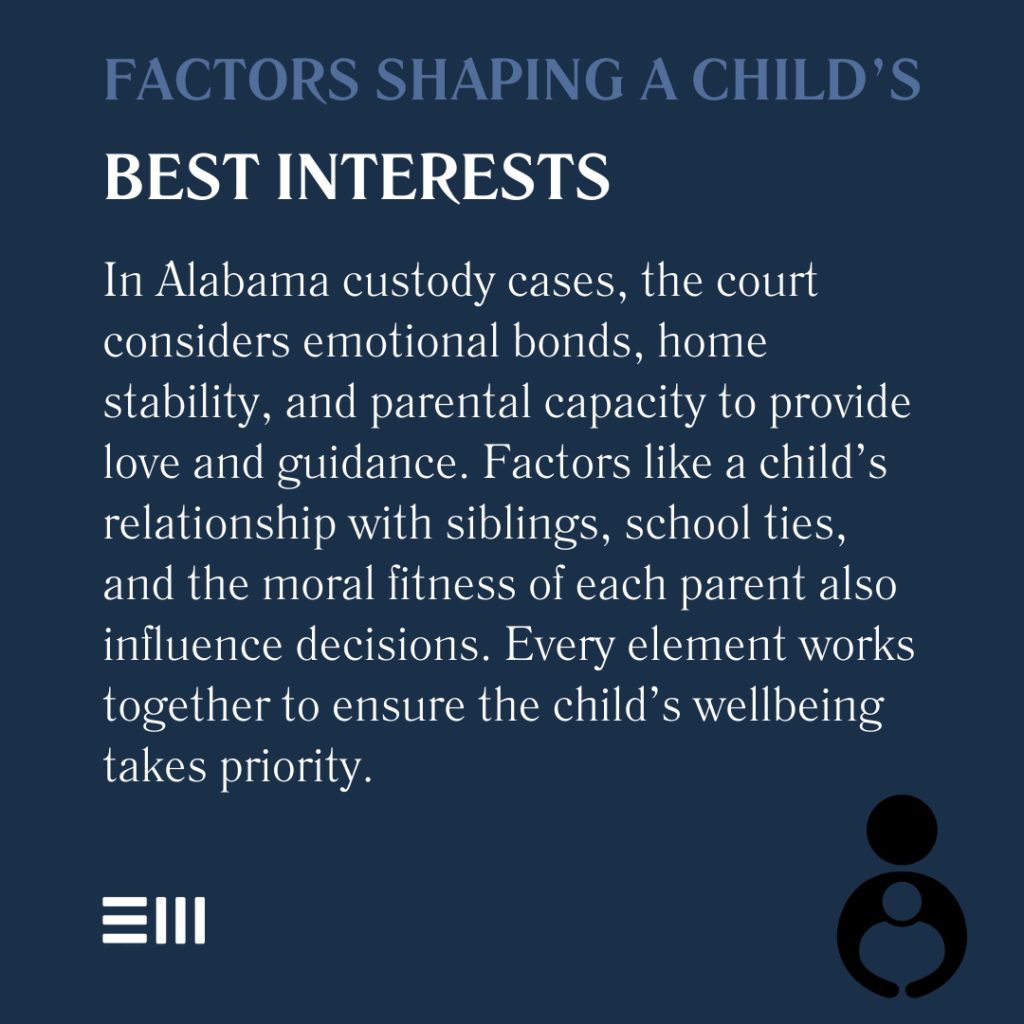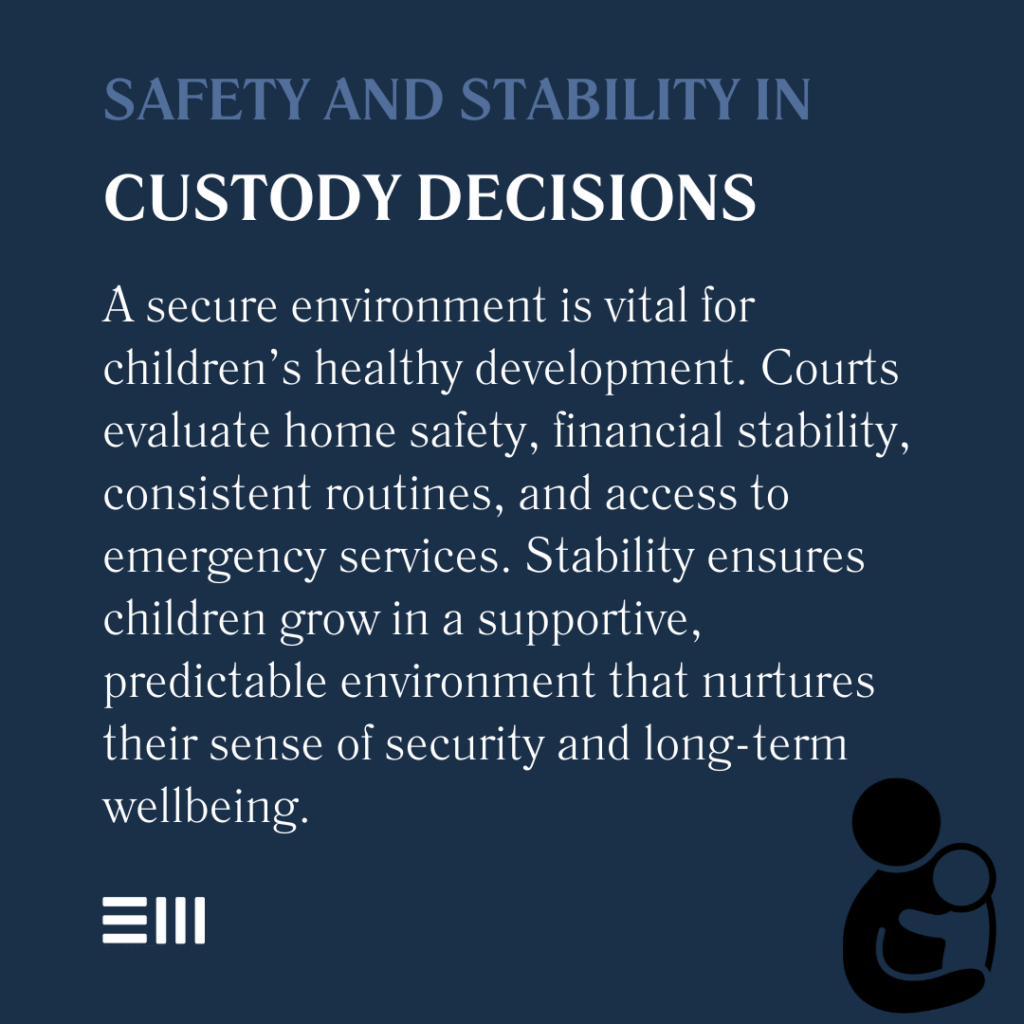
Inside Alabama courtrooms, a simple phrase shapes countless childhoods: “the best interest of the child.”
Behind these words lies a complex web of factors that judges weigh as they make decisions that ripple through family dinners, weekend plans, and holiday celebrations for years to come.
Core Factors in Best Interest Determinations
Alabama courts evaluate multiple elements when determining a child’s best interests in custody cases.
These factors work together to create a complete picture of what arrangement will best serve the child’s physical, emotional, and developmental needs.
Primary considerations include:
- The emotional bonds between each parent and child;
- Each parent’s demonstrated capacity to provide love and guidance;
- The stability of each home environment;
- Each parent’s physical and mental health;
- The child’s relationship with siblings and extended family;
- The child’s ties to school, community, and activities;
- Each parent’s willingness to support the other’s relationship with the child;
- Any history of domestic violence or substance abuse;
- The child’s adjustment to their current living situation; and
- The moral fitness of each parent.
Understanding these factors helps parents focus on what truly matters to the court. Each element contributes to the overall determination of the child’s best interests.

Safety and Stability Considerations
Creating a safe and stable environment remains paramount in best interest determinations.
Courts carefully evaluate factors that impact a child’s sense of security and consistency in their daily life.
Key safety and stability factors include:
- Home environment safety and appropriateness;
- Neighborhood safety and resources;
- Consistency in daily routines and schedules;
- Access to reliable transportation;
- Financial stability of each parent;
- Work schedule stability;
- Childcare arrangements;
- Emergency response plans;
- Home security measures;
- Environmental hazards;
- Access to emergency services; and
- Supervision arrangements.
These elements help ensure children maintain a secure foundation for healthy development. Courts prioritize arrangements that provide consistent stability.

Educational and Developmental Needs
A child’s educational progress and developmental needs play a crucial role in custody decisions. Courts examine how each parent supports their child’s learning and growth.
Important educational factors include:
- School performance and attendance records;
- Parent involvement in education;
- Homework support and academic encouragement;
- Special education needs and accommodations;
- Access to quality schools and resources;
- Extracurricular activity participation;
- Educational enrichment opportunities;
- Parent-teacher communication;
- College preparation support;
- Learning disability management;
- Study environment quality; and
- Educational decision-making ability.
Supporting educational success demonstrates a commitment to child development. Courts favor arrangements that prioritize educational achievement.
Physical and Mental Health Care
Access to appropriate healthcare and attention to a child’s physical and mental well-being significantly impact custody decisions. Courts examine each parent’s ability to meet these essential needs.
Healthcare considerations include:
- Regular medical and dental care access;
- Mental health support availability;
- Medical insurance coverage;
- Medication management ability;
- Special health needs accommodation;
- Emergency care arrangements;
- Therapeutic service coordination;
- Health record maintenance;
- Dietary needs management;
- Exercise and activity support;
- Sleep schedule maintenance; and
- Stress management support.
Proper healthcare management demonstrates responsible parenting capability. Courts prioritize arrangements ensuring comprehensive health care access.
Emotional and Social Development
Supporting a child’s emotional growth and social relationships plays a vital role in custody determinations. Courts evaluate how each parent nurtures these developmental aspects.
Key emotional and social factors include:
- Age-appropriate emotional support;
- Peer relationship encouragement;
- Family relationship maintenance;
- Social skill development;
- Cultural identity support;
- Religious or spiritual guidance;
- Self-esteem building;
- Conflict resolution skills;
- Behavioral guidance;
- Emotional intelligence development;
- Social activity participation; and
- Identity development support.
Nurturing emotional and social growth supports healthy child development. Courts favor arrangements promoting positive relationship development.
Parental Cooperation and Communication
The ability of parents to work together significantly impacts best interest determinations. Courts evaluate how effectively parents can collaborate for their child’s benefit.
Important cooperation elements include:
- Respectful communication patterns;
- Willingness to collaborate on decisions;
- Schedule flexibility and accommodation;
- Information sharing effectiveness;
- Conflict resolution abilities;
- Co-parenting skill development;
- Boundary respect;
- Agreement compliance;
- Joint decision-making capability;
- Support for other parent’s role;
- Positive attitude maintenance; and
- Professional interaction standards.
Effective co-parenting demonstrates commitment to child wellbeing. Courts favor arrangements supporting positive parental cooperation.
Age-Specific Considerations
Children’s needs vary significantly by age, and courts adjust their best interest analysis accordingly. Understanding age-specific factors helps create appropriate custody arrangements.
Age-related considerations include:
- Infant attachment needs;
- Toddler routine requirements;
- Preschool socialization needs;
- School-age academic support;
- Preteen independence development;
- Teenage activity involvement;
- Age-appropriate discipline;
- Developmental milestone support;
- Peer relationship needs;
- Identity formation support;
- Independence cultivation; and
- Age-specific emotional needs.
Age-appropriate arrangements support healthy development stages. Courts tailor decisions to match developmental needs.
Frequently Asked Questions About the Best Interest Standard in Alabama
Understanding the best interest standard raises many questions for parents.
Here are answers to common concerns about how Alabama courts determine children’s best interests.
How Does the Court Consider a Child’s Preference?
Courts weigh children’s preferences based on age, maturity, and reasoning ability, but this represents just one factor in the overall decision.
What Weight Do Expert Opinions Carry?
Professional evaluations from psychologists, counselors, or social workers can significantly influence best interest determinations.
How Does Relocation Impact Best Interest Analysis?
Courts carefully evaluate how potential moves affect children’s stability, relationships, and overall well-being.
What Role Do Extended Family Relationships Play?
Strong extended family bonds can influence custody decisions, particularly when family members provide support and stability.
How Do Courts Handle Special Needs Children?
Courts give special consideration to medical, educational, and therapeutic needs when determining custody arrangements.
Protect Your Child’s Best Interests Today
Your child deserves an arrangement that truly serves their needs. Our experienced family law attorneys understand how Alabama courts evaluate best interests and can help present your case effectively.
Contact us for a confidential consultation about your custody situation.
Can't find what you're looking for? Search our site below.










